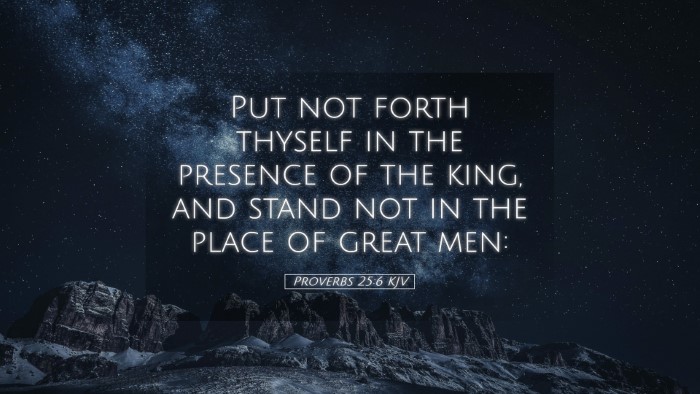Commentary on Proverbs 25:6
Verse Text: "Put not forth thyself in the presence of the king, and stand not in the place of great men."
Introduction
The verse encapsulates timeless wisdom regarding humility and the appropriate attitudes when in the presence of authority. Through the insights derived from esteemed biblical scholars, a greater understanding of this verse’s implications for behavior and relationships within societal hierarchies will be explored.
General Exegesis
Proverbs 25:6 serves as a caution against self-exaltation and promotes a posture of humility before those in positions of power. The instruction to "put not forth thyself" indicates a call to refrain from self-promotion and striving for recognition among the influential. This principle resonates throughout Scripture and can be found in various forms, encouraging believers to seek the path of humility.
Matthew Henry's Commentary
Henry emphasizes the importance of humility, asserting that one should not seek to elevate oneself before kings or in the company of great men. He interprets this admonition as a warning against pride and presumption, which can lead to disgrace. The presence of powerful individuals requires not only respect but an awareness of one’s position and limitations. Henry advises that humility is not merely a virtue but a safeguard against the follies of haughtiness.
Albert Barnes’ Explanation
Barnes elaborates on the cultural context of the passage. He notes that in ancient courts, it was essential to understand one’s role and the natural order of social structures. To adopt an arrogant attitude, especially in the presence of royalty, could result in severe consequences. Barnes infers that this verse advises individuals to allow their character and actions to speak for them rather than pursuing acknowledgment excessively. Moreover, he relates this to the New Testament teachings on humility, such as those found in Matthew 23:12, where Jesus stated, “For whoever exalts himself will be humbled, and whoever humbles himself will be exalted.”
Adam Clarke’s Analysis
Clarke provides a more practical approach, interpreting this verse as advice for individuals engaging in social or political life. He posits that one should be cautious of overstepping boundaries and should recognize the hierarchy that exists. This guidance is especially pertinent for those who aspire to influence or leadership; understanding when to adopt a low profile is crucial. Clarke correlates this humility with wisdom, suggesting that true leaders often demonstrate restraint and thoughtful consideration of their actions, avoiding premature assertion of their status or abilities.
Thematic Insights
- The Value of Humility: Across various commentaries, a central theme emerges: humility is sacred. In God's kingdom, the lowly are exalted, while pride brings downfall.
- Social Hierarchies: Understanding and respecting one's position within societal structures is crucial to effective interpersonal relations.
- Self-Promotion vs. Recognition: The balance between achieving recognition for good works and avoiding undue self-promotion is necessary for maintaining integrity and humility.
Practical Applications for Pastors and Leaders
For pastors and leaders, Proverbs 25:6 can serve as a guiding principle in ministry and church leadership. It is vital to cultivate an attitude that values humility within church contexts, fostering environments where God receives the glory rather than individuals. Encouraging congregations to serve with humility can build a robust community rooted in love and respect.
Conclusion
The wisdom found in Proverbs 25:6 transcends time and cultural boundaries. Through a careful study of the insights offered by Matthew Henry, Albert Barnes, and Adam Clarke, it becomes evident that humility before authority is not merely about societal etiquette but reflects a deeper understanding of one’s identity in relation to God and others. By embracing this principle, individuals can aspire to live out the truth that true greatness often lies in serving and recognizing the value of every person, regardless of status.


